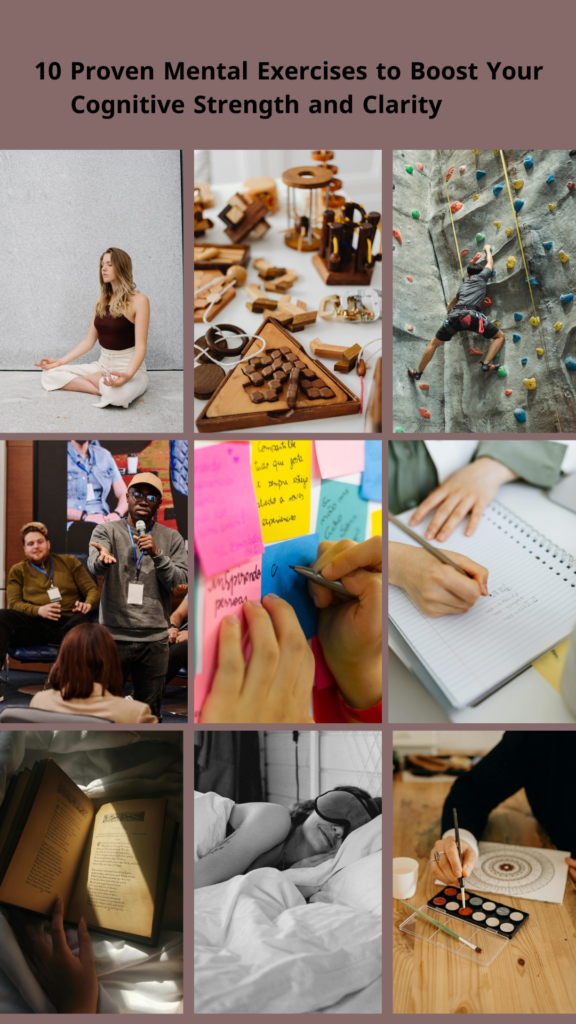In today’s fast-paced digital world, mental strength is just as crucial as physical fitness. Your brain is your most powerful tool—sharpening it will enhance your focus, memory, decision-making, and creativity. From managing work stress to improving problem-solving, a sharper mind means a better quality of life.
Much like a muscle, the brain thrives when exercised regularly. Mental exercises for cognitive strength, such as meditation, brain games, and journaling, are crucial for enhancing focus, memory, and overall mental clarity In this guide, we’ll explore 10 powerful exercises—backed by science and easy to incorporate into your daily routine.

1. Practice Meditation to Improve Focus and Mindfulness
Meditation is one of the most impactful mental exercises for achieving mental clarity. When you meditate, you train your mind to focus on the present moment, improving concentration, reducing stress, and fostering emotional stability.
How Meditation Boosts Cognitive Strength
Research shows that regular meditation strengthens areas of the brain responsible for memory, focus, and emotional regulation. Mindfulness meditation, in particular, improves neuroplasticity—the brain’s ability to reorganize itself by forming new neural connections.
How to Start Meditating
- Find a quiet space free of distractions.
- Sit comfortably with your back straight and close your eyes.
- Focus on your breathing: inhale deeply, exhale slowly.
- If your mind wanders, gently redirect your attention back to your breath.
Start with just 10 minutes daily and gradually increase as you feel comfortable. Apps like Headspace or Calm can guide beginners through simple meditation techniques.
2. Stimulate Your Brain with Puzzles and Games
Brain games and puzzles are a fun, effective way to challenge and strengthen your mind. Whether it’s crosswords, Sudoku, chess, or logic puzzles, these activities force your brain to think critically, make decisions, and develop creative solutions.
Benefits of Brain Games
- Improves problem-solving skills and memory.
- Increases focus by stimulating attention and concentration.
- Reduces the risk of cognitive decline as you age.
Best Brain Exercises to Try
- Play Sudoku or crosswords for 20-30 minutes a day.
- Try apps like Lumosity or Elevate for brain training.
- Challenge yourself with chess or word games with friends.
By incorporating brain puzzles into your routine, you’ll improve your cognitive agility and have fun in the process.
3. Learn a New Skill to Challenge Your Brain
The brain loves novelty. Learning something new is one of the most effective ways to build cognitive strength and improve mental agility. Activities that push your brain outside its comfort zone activate neuroplasticity, improving your memory and problem-solving skills.
Ideas for Learning New Skills
- Learn a new language: Use apps like Duolingo to start.
- Pick up an instrument: Learning guitar or piano strengthens coordination and memory.
- Try coding: Platforms like Codecademy make it easy for beginners.
- Take a cooking class: Cooking combines creativity, planning, and focus.
Set a goal to dedicate 1-2 hours a week to your chosen skill. The process of learning is as important as the outcome, keeping your brain sharp and engaged.
4. Exercise Your Body to Sharpen Your Brain
Physical exercise is a game-changer for cognitive health. Movement isn’t just for your body—regular exercise increases blood flow to the brain, promoting the growth of new neurons and improving mental clarity.
How Exercise Enhances Brain Health
- Increases hippocampus size, enhancing memory.
- Reduces stress and boosts mood with endorphin release.
- Improves focus, creativity, and problem-solving abilities.
Types of Brain-Boosting Exercises
- Aerobic workouts: Running, cycling, and swimming improve oxygen flow to the brain.
- Strength training: Builds endurance while reducing cognitive decline.
- Yoga and Tai Chi: Improve mindfulness, balance, and brain-body coordination.
Aim for 30 minutes of physical activity five times a week. Even simple activities like walking or dancing can work wonders for your mental sharpness.
5. Write Daily Journals to Clarify Your Thoughts
Journaling is a powerful tool for reflection and mental clarity. Writing down your thoughts not only organizes them but also helps you process emotions and solve problems effectively.
Why Journaling Boosts Cognitive Strength
- Enhances emotional intelligence and self-awareness.
- Reduces stress and anxiety by decluttering the mind.
- Improves memory, focus, and problem-solving.
How to Start Journaling
- Dedicate 10-15 minutes daily to write in a notebook.
- Start simple: Reflect on your day, your goals, or things you’re grateful for.
- Write without judgment or editing. Let your thoughts flow freely.
Prompts like “What challenges did I face today?” or “What am I excited about this week?” can help get you started.
6. Engage in Social Interaction to Sharpen Your Mind
Human interaction plays a crucial role in mental agility. Engaging in conversations, debates, and group activities stimulates various parts of the brain, enhancing communication, memory, and creativity.
Benefits of Socializing for Cognitive Strength
- Improves quick thinking and decision-making skills.
- Enhances emotional intelligence and reduces loneliness.
- Keeps your mind active and agile through diverse perspectives.
How to Socialize More Effectively
- Join social clubs, book clubs, or local workshops.
- Schedule weekly calls or coffee meet-ups with friends.
- Engage in group problem-solving activities or debates.
Make it a habit to interact meaningfully with others. Even casual conversations challenge your brain to think fast and creatively.
7. Practice Visualization to Unlock Creativity
Visualization is a powerful mental exercise where you create vivid mental images to achieve clarity, solve problems, or enhance creativity. Athletes, entrepreneurs, and artists use visualization to prepare for success.
How Visualization Works
When you vividly picture a goal or solution, your brain activates the same areas as if you were experiencing it in reality. This enhances focus, planning, and motivation.
How to Practice Visualization
- Sit in a quiet place and close your eyes.
- Focus on a specific goal or problem.
- Imagine, in vivid detail, yourself achieving it step by step.
Spend 5-10 minutes daily visualizing positive outcomes. The more detailed your visualization, the more impactful it will be.
8. Read Regularly to Expand Your Knowledge
Reading is the ultimate mental workout. Whether you’re reading fiction, non-fiction, or self-development books, it engages critical thinking, comprehension, and imagination.
Benefits of Reading for Cognitive Strength
- Improves focus and attention span.
- Strengthens vocabulary, communication, and problem-solving skills.
- Stimulates creativity and expands your knowledge base.
Tips for Building a Reading Habit
- Set aside at least 20 minutes a day to read.
- Explore diverse genres: fiction, science, philosophy, or business.
- Join a book club for accountability and discussion.
Reading regularly not only strengthens your brain but also enriches your life.
9. Try Mind Mapping to Improve Problem-Solving
Mind mapping is a visual tool that organizes your thoughts, ideas, and solutions in a structured way. It’s particularly useful for brainstorming and solving complex problems.
How to Create a Mind Map
- Write the main idea in the center of a page.
- Branch out with related subtopics, drawing lines to connect them.
- Add details, solutions, or next steps to each branch.
Mind mapping improves focus, memory, and logical thinking, making it a perfect tool for both personal and professional growth.
10. Get Quality Sleep to Restore Brain Power
A sharp brain requires sufficient rest. Sleep is when the brain processes information, consolidates memories, and clears mental clutter.
How Sleep Enhances Cognitive Strength
- Improves memory retention and learning.
- Enhances creativity and focus during waking hours.
- Reduces mental fatigue and sharpens decision-making skills.
Aim for 7-8 hours of sleep every night. Establish a consistent bedtime routine, avoid screens before bed, and create a restful environment to improve sleep quality.
Final Thoughts
Your brain is your most valuable asset, and like any muscle, it thrives on regular exercise. By incorporating these 10 mental exercises—meditation, brain games, new skills, physical workouts, journaling, and more—you can significantly enhance your focus, memory, and mental clarity.
Start small: Choose 2-3 activities from this list and add them to your routine. Over time, you’ll notice tangible improvements in your cognitive strength and overall well-being. Remember, a sharper mind leads to a sharper life.



